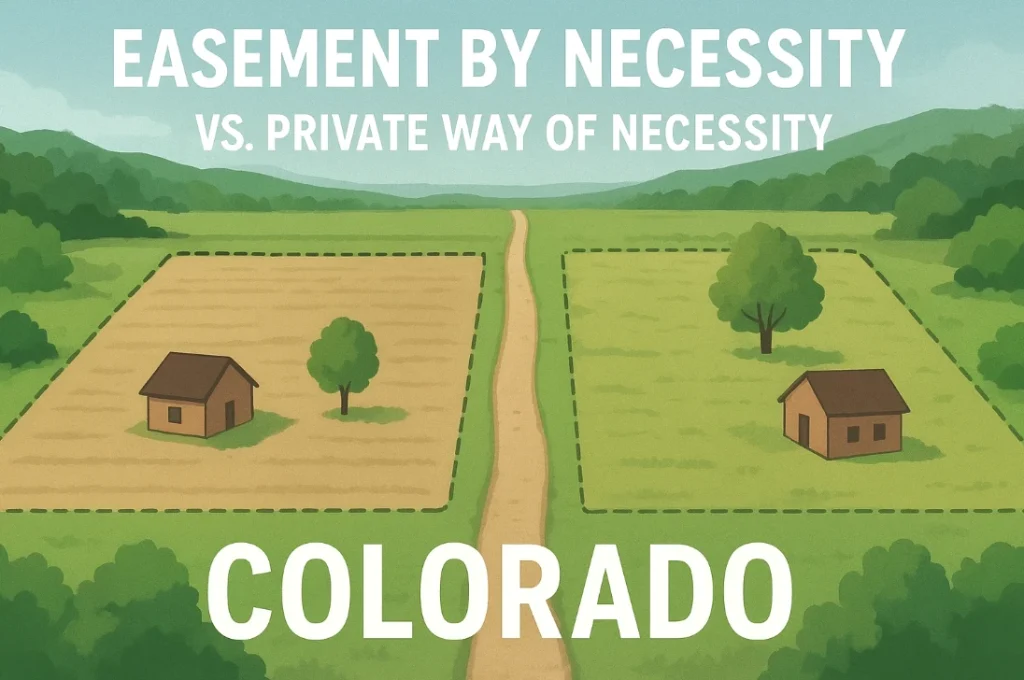The purpose of this article is to explain the difference in Colorado between an easement by necessity in Colorado and a private way of necessity. Landowners, real estate agents, lawyers, and even courts sometimes confuse the two or use terminology that confuses the two distinct concepts.
Background
In Colorado, a landowner who needs access across an adjacent landowner’s property to access their own parcel, and who does not have a written easement, may be able to obtain an implied easement such as an easement by necessity, an easement implied by pre-existing use, or a prescriptive easement.
To obtain an implied easement, the landowner seeking access must sue the adjacent landowner and obtain a Decree that grants and describes the easement. Sometimes the threat of such an action is sufficient to convince the adjacent landowner to simply sell an easement to the landowner that needs access.
Easement by Necessity
One type of implied easement is an easement by necessity. An easement by necessity arises when a landowner conveys a portion of their parcel to another, which leaves the remainder of the land without ingress or egress, except over the part conveyed. To obtain an easement by necessity the claimant must prove that (1) the original ownership of the entire tract was held by a single grantor prior to a division thereof; (2) the necessity existed at the time of the severance; and (3) the necessity is great. Wagner v. Fairlamb, 379 P.2d 165 (Colo. 1963). Necessity has been interpreted to mean the absence of a reasonably practical way to and from plaintiff’s land that the plaintiff has a legally enforceable right to use. Thompson v. Whinnery, 895 P.2d 537 (Colo. 1995).
Condemnation of a Private Way of Necessity
But what happens when a landowner can’t prove that he or she is entitled to an easement by necessity or any other implied easement? For instance, the owner of a mining claim may not be able to show that ownership of the entire tract was ever held by a single grantor.
In cases where no implied easement is available, Colorado offers an alternative – condemnation of a private way of necessity under Article II, Section 14 of the Colorado Constitution. That Section provides:
Private property shall not be taken for private use unless by consent of the owner, except for private ways of necessity, and except for reservoirs, drains, flumes or ditches on or across the lands of others, for agricultural, mining, milling, domestic or sanitary purposes.
The right to condemn a private “way of necessity” is a remedy of last resort when common law principles would otherwise not provide legal access to landlocked parcels. The process is governed by statute at Section 38-1-102(3), C.R.S.
Unlike an easement by necessity, it is not necessary to show unity of title in the past to condemn a private way of necessity under the Colorado Constitution. Bear Creek Dev. Corp. v. Dyer, 790 P.2d 897 (Colo. App. 1990); Crystal Park Co. v. Morton, 27 Colo. App. 74, 146 P. 566 (1915). In fact, to condemn a private way of necessity the petitioner must show that an easement by necessity is not available.
“Private ways of necessity” are “passageways or roadways necessary in the sense that they are indispensable to the practical use of the property for which they are claimed.” Bear Creek Dev. Corp. v. Dyer, 790 P.2d 897 (Colo.App.1990). However, the necessity need not be absolute, but rather the way must be reasonably necessary under the facts and circumstances of the case. Bear Creek Dev. Corp. v. Genesee Foundation, 919 P.2d 948, 951 (Colo.App.1996); see also, Tieze v. Killam, 179 P.3d 10 (Colo. App. 2007) (Private condemnation case).
If a prospective condemnor establishes necessity for a private way of access, the party who seeks to avoid condemnation may do so by showing an alternate route over property owned by someone else. The party seeking to avoid condemnation “has the burden of pleading and proving that an acceptable alternate route exists and that the [prospective condemnor] has a present enforceable right to use it.” Freeman v. Rost Family Trust, 973 P.2d 1281, 1284 (Colo.App.1999);
West v. Hinksmon, 857 P.2d 483 (Colo. App. 1992). Even if such an alternate route exists, however, “an action for a way of necessity may still lie if the alternate route is impractical, unreasonable, or prohibited by cost grossly in excess of the value of the dominant estate.” West, supra, 857 P.2d at 486. The party seeking to avoid condemnation also bears the burden of proof with respect to these considerations of practicality and cost. West, supra, 857 P.2d at 486.
If you have concerns about access to your property, please call me at (303) 638-3410.


